Cashless Society: Utopia or Platform for Scams? A Singapore Study
VerifiedAdded on 2023/06/13
|72
|15321
|89
Report
AI Summary
This report investigates the concept of a cashless society, exploring whether it represents a utopian ideal or a breeding ground for scams, with a specific focus on Singapore's experience. It begins by introducing the evolution of payment methods from traditional cash transactions to modern digital systems like SMS, QR codes, and NFC, highlighting the advantages and disadvantages of this shift. The research employs both primary data, gathered through questionnaires and interviews to understand public perception and experiences, and secondary data, including statistical analysis of fraud cases. The findings suggest that while cashless systems offer convenience and economic benefits, they also present increased opportunities for fraudulent activities. The report concludes with recommendations for mitigating risks and ensuring a secure transition to a cashless society, alongside suggestions for future research in this area. Desklib provides access to similar reports and study resources for students.
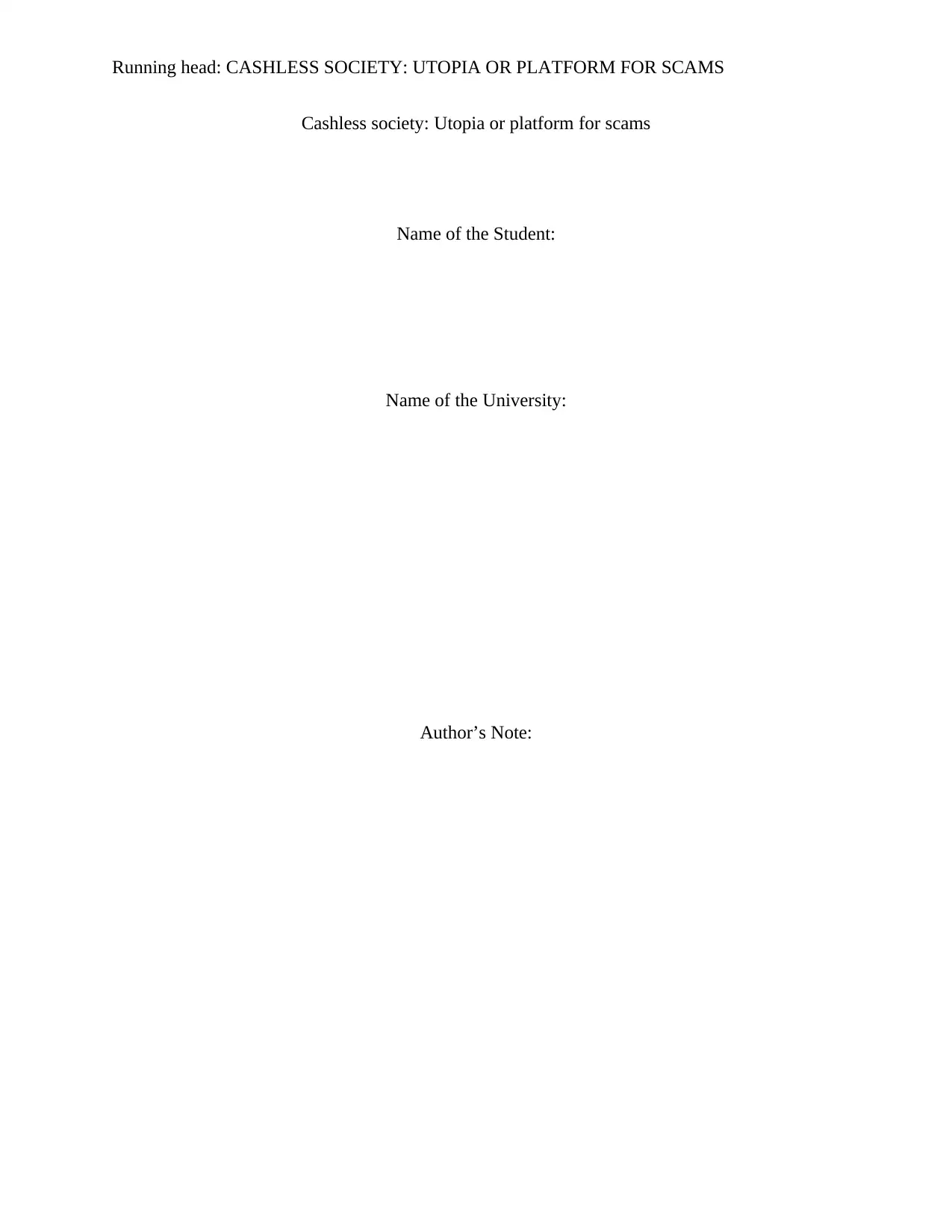
Running head: CASHLESS SOCIETY: UTOPIA OR PLATFORM FOR SCAMS
Cashless society: Utopia or platform for scams
Name of the Student:
Name of the University:
Author’s Note:
Cashless society: Utopia or platform for scams
Name of the Student:
Name of the University:
Author’s Note:
Paraphrase This Document
Need a fresh take? Get an instant paraphrase of this document with our AI Paraphraser
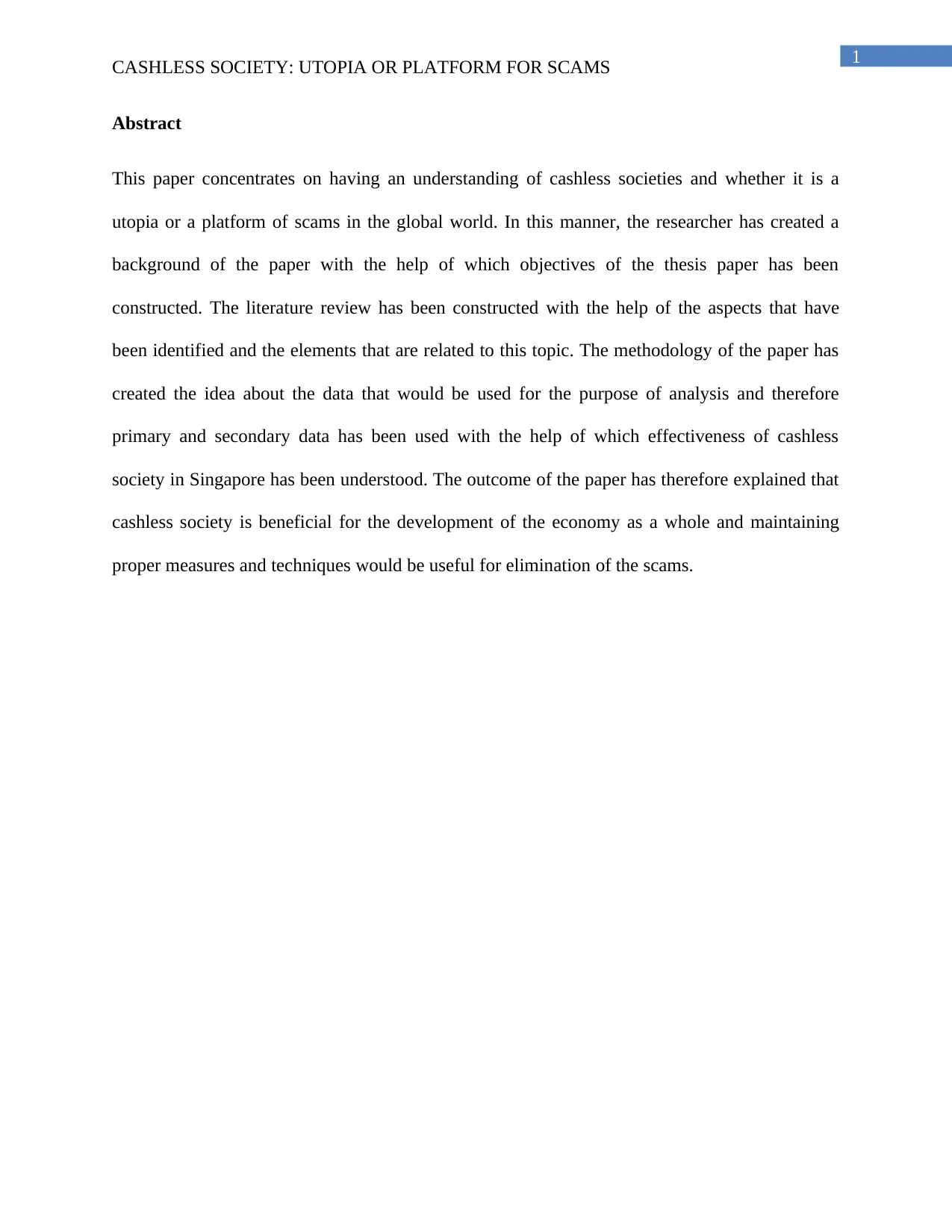
1
CASHLESS SOCIETY: UTOPIA OR PLATFORM FOR SCAMS
Abstract
This paper concentrates on having an understanding of cashless societies and whether it is a
utopia or a platform of scams in the global world. In this manner, the researcher has created a
background of the paper with the help of which objectives of the thesis paper has been
constructed. The literature review has been constructed with the help of the aspects that have
been identified and the elements that are related to this topic. The methodology of the paper has
created the idea about the data that would be used for the purpose of analysis and therefore
primary and secondary data has been used with the help of which effectiveness of cashless
society in Singapore has been understood. The outcome of the paper has therefore explained that
cashless society is beneficial for the development of the economy as a whole and maintaining
proper measures and techniques would be useful for elimination of the scams.
CASHLESS SOCIETY: UTOPIA OR PLATFORM FOR SCAMS
Abstract
This paper concentrates on having an understanding of cashless societies and whether it is a
utopia or a platform of scams in the global world. In this manner, the researcher has created a
background of the paper with the help of which objectives of the thesis paper has been
constructed. The literature review has been constructed with the help of the aspects that have
been identified and the elements that are related to this topic. The methodology of the paper has
created the idea about the data that would be used for the purpose of analysis and therefore
primary and secondary data has been used with the help of which effectiveness of cashless
society in Singapore has been understood. The outcome of the paper has therefore explained that
cashless society is beneficial for the development of the economy as a whole and maintaining
proper measures and techniques would be useful for elimination of the scams.
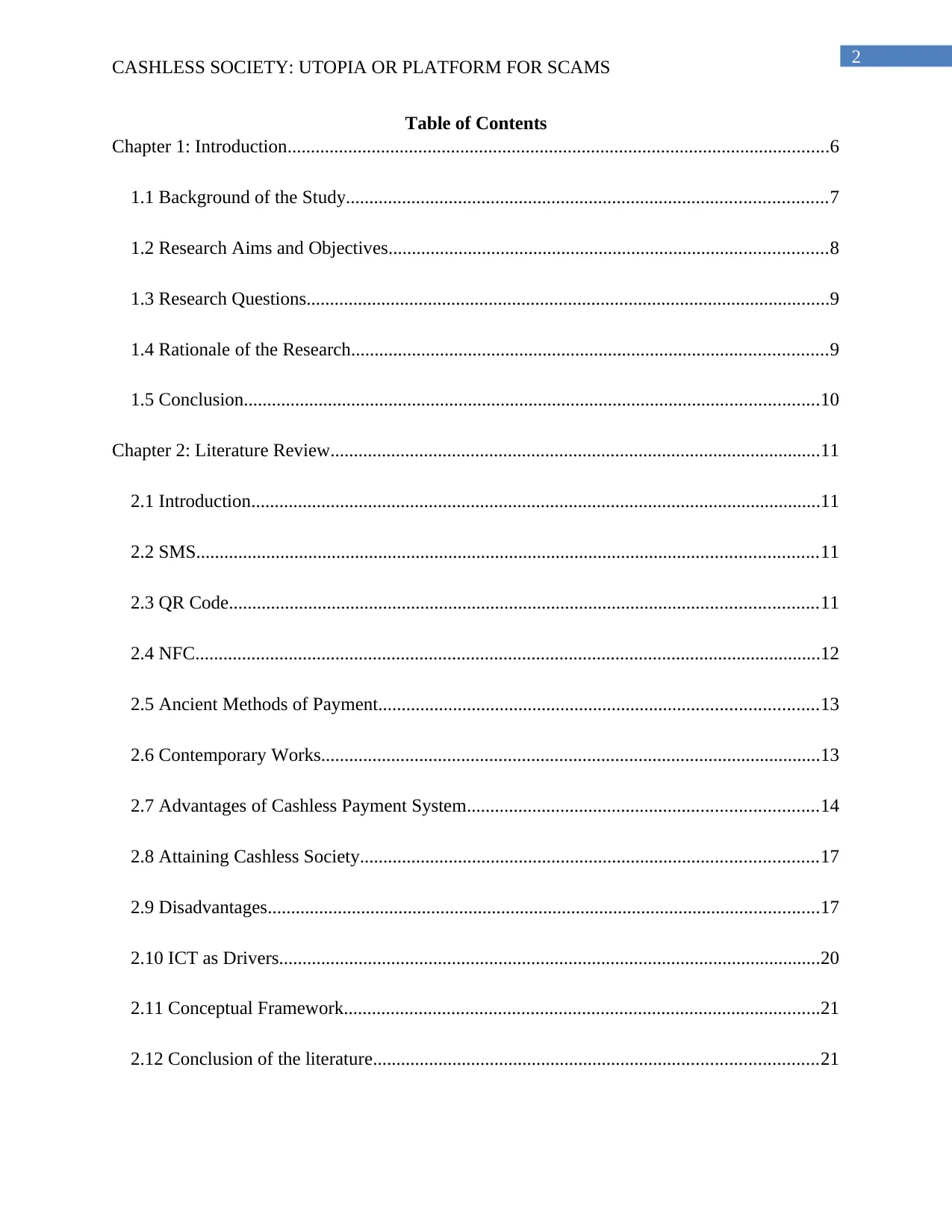
2
CASHLESS SOCIETY: UTOPIA OR PLATFORM FOR SCAMS
Table of Contents
Chapter 1: Introduction....................................................................................................................6
1.1 Background of the Study.......................................................................................................7
1.2 Research Aims and Objectives..............................................................................................8
1.3 Research Questions................................................................................................................9
1.4 Rationale of the Research......................................................................................................9
1.5 Conclusion...........................................................................................................................10
Chapter 2: Literature Review.........................................................................................................11
2.1 Introduction..........................................................................................................................11
2.2 SMS.....................................................................................................................................11
2.3 QR Code..............................................................................................................................11
2.4 NFC......................................................................................................................................12
2.5 Ancient Methods of Payment..............................................................................................13
2.6 Contemporary Works...........................................................................................................13
2.7 Advantages of Cashless Payment System...........................................................................14
2.8 Attaining Cashless Society..................................................................................................17
2.9 Disadvantages......................................................................................................................17
2.10 ICT as Drivers....................................................................................................................20
2.11 Conceptual Framework......................................................................................................21
2.12 Conclusion of the literature...............................................................................................21
CASHLESS SOCIETY: UTOPIA OR PLATFORM FOR SCAMS
Table of Contents
Chapter 1: Introduction....................................................................................................................6
1.1 Background of the Study.......................................................................................................7
1.2 Research Aims and Objectives..............................................................................................8
1.3 Research Questions................................................................................................................9
1.4 Rationale of the Research......................................................................................................9
1.5 Conclusion...........................................................................................................................10
Chapter 2: Literature Review.........................................................................................................11
2.1 Introduction..........................................................................................................................11
2.2 SMS.....................................................................................................................................11
2.3 QR Code..............................................................................................................................11
2.4 NFC......................................................................................................................................12
2.5 Ancient Methods of Payment..............................................................................................13
2.6 Contemporary Works...........................................................................................................13
2.7 Advantages of Cashless Payment System...........................................................................14
2.8 Attaining Cashless Society..................................................................................................17
2.9 Disadvantages......................................................................................................................17
2.10 ICT as Drivers....................................................................................................................20
2.11 Conceptual Framework......................................................................................................21
2.12 Conclusion of the literature...............................................................................................21
⊘ This is a preview!⊘
Do you want full access?
Subscribe today to unlock all pages.

Trusted by 1+ million students worldwide
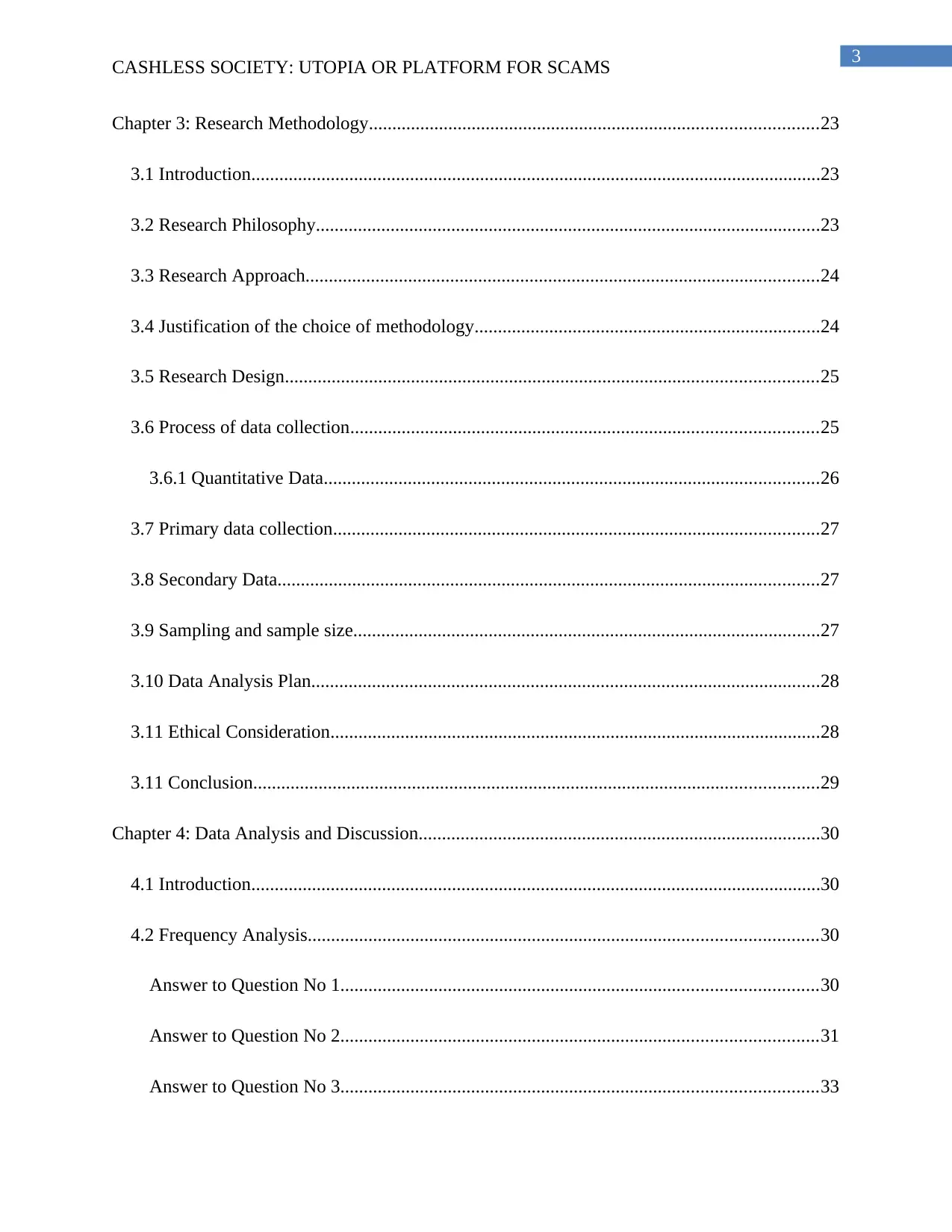
3
CASHLESS SOCIETY: UTOPIA OR PLATFORM FOR SCAMS
Chapter 3: Research Methodology................................................................................................23
3.1 Introduction..........................................................................................................................23
3.2 Research Philosophy............................................................................................................23
3.3 Research Approach..............................................................................................................24
3.4 Justification of the choice of methodology..........................................................................24
3.5 Research Design..................................................................................................................25
3.6 Process of data collection....................................................................................................25
3.6.1 Quantitative Data..........................................................................................................26
3.7 Primary data collection........................................................................................................27
3.8 Secondary Data....................................................................................................................27
3.9 Sampling and sample size....................................................................................................27
3.10 Data Analysis Plan.............................................................................................................28
3.11 Ethical Consideration.........................................................................................................28
3.11 Conclusion.........................................................................................................................29
Chapter 4: Data Analysis and Discussion......................................................................................30
4.1 Introduction..........................................................................................................................30
4.2 Frequency Analysis.............................................................................................................30
Answer to Question No 1......................................................................................................30
Answer to Question No 2......................................................................................................31
Answer to Question No 3......................................................................................................33
CASHLESS SOCIETY: UTOPIA OR PLATFORM FOR SCAMS
Chapter 3: Research Methodology................................................................................................23
3.1 Introduction..........................................................................................................................23
3.2 Research Philosophy............................................................................................................23
3.3 Research Approach..............................................................................................................24
3.4 Justification of the choice of methodology..........................................................................24
3.5 Research Design..................................................................................................................25
3.6 Process of data collection....................................................................................................25
3.6.1 Quantitative Data..........................................................................................................26
3.7 Primary data collection........................................................................................................27
3.8 Secondary Data....................................................................................................................27
3.9 Sampling and sample size....................................................................................................27
3.10 Data Analysis Plan.............................................................................................................28
3.11 Ethical Consideration.........................................................................................................28
3.11 Conclusion.........................................................................................................................29
Chapter 4: Data Analysis and Discussion......................................................................................30
4.1 Introduction..........................................................................................................................30
4.2 Frequency Analysis.............................................................................................................30
Answer to Question No 1......................................................................................................30
Answer to Question No 2......................................................................................................31
Answer to Question No 3......................................................................................................33
Paraphrase This Document
Need a fresh take? Get an instant paraphrase of this document with our AI Paraphraser
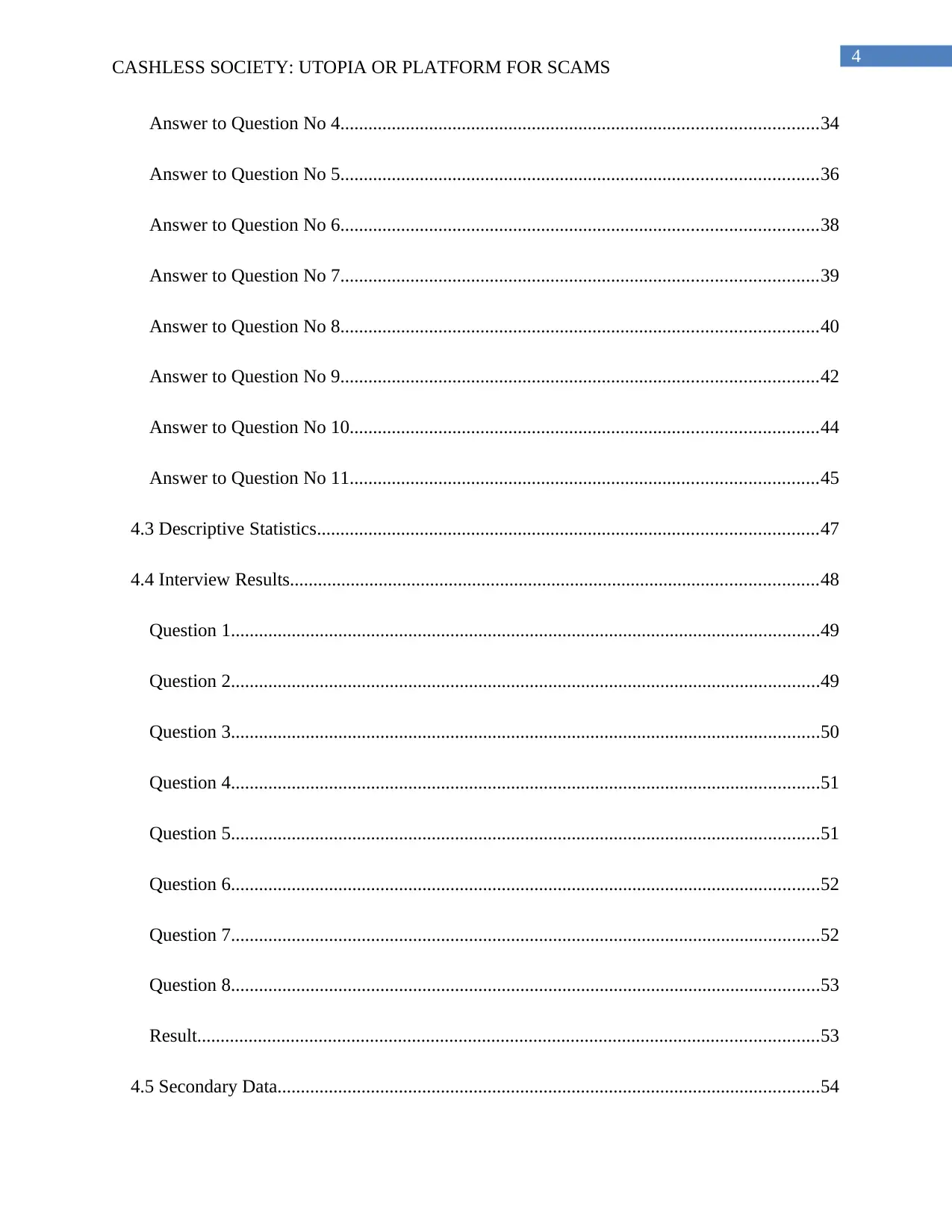
4
CASHLESS SOCIETY: UTOPIA OR PLATFORM FOR SCAMS
Answer to Question No 4......................................................................................................34
Answer to Question No 5......................................................................................................36
Answer to Question No 6......................................................................................................38
Answer to Question No 7......................................................................................................39
Answer to Question No 8......................................................................................................40
Answer to Question No 9......................................................................................................42
Answer to Question No 10....................................................................................................44
Answer to Question No 11....................................................................................................45
4.3 Descriptive Statistics...........................................................................................................47
4.4 Interview Results.................................................................................................................48
Question 1..............................................................................................................................49
Question 2..............................................................................................................................49
Question 3..............................................................................................................................50
Question 4..............................................................................................................................51
Question 5..............................................................................................................................51
Question 6..............................................................................................................................52
Question 7..............................................................................................................................52
Question 8..............................................................................................................................53
Result.....................................................................................................................................53
4.5 Secondary Data....................................................................................................................54
CASHLESS SOCIETY: UTOPIA OR PLATFORM FOR SCAMS
Answer to Question No 4......................................................................................................34
Answer to Question No 5......................................................................................................36
Answer to Question No 6......................................................................................................38
Answer to Question No 7......................................................................................................39
Answer to Question No 8......................................................................................................40
Answer to Question No 9......................................................................................................42
Answer to Question No 10....................................................................................................44
Answer to Question No 11....................................................................................................45
4.3 Descriptive Statistics...........................................................................................................47
4.4 Interview Results.................................................................................................................48
Question 1..............................................................................................................................49
Question 2..............................................................................................................................49
Question 3..............................................................................................................................50
Question 4..............................................................................................................................51
Question 5..............................................................................................................................51
Question 6..............................................................................................................................52
Question 7..............................................................................................................................52
Question 8..............................................................................................................................53
Result.....................................................................................................................................53
4.5 Secondary Data....................................................................................................................54
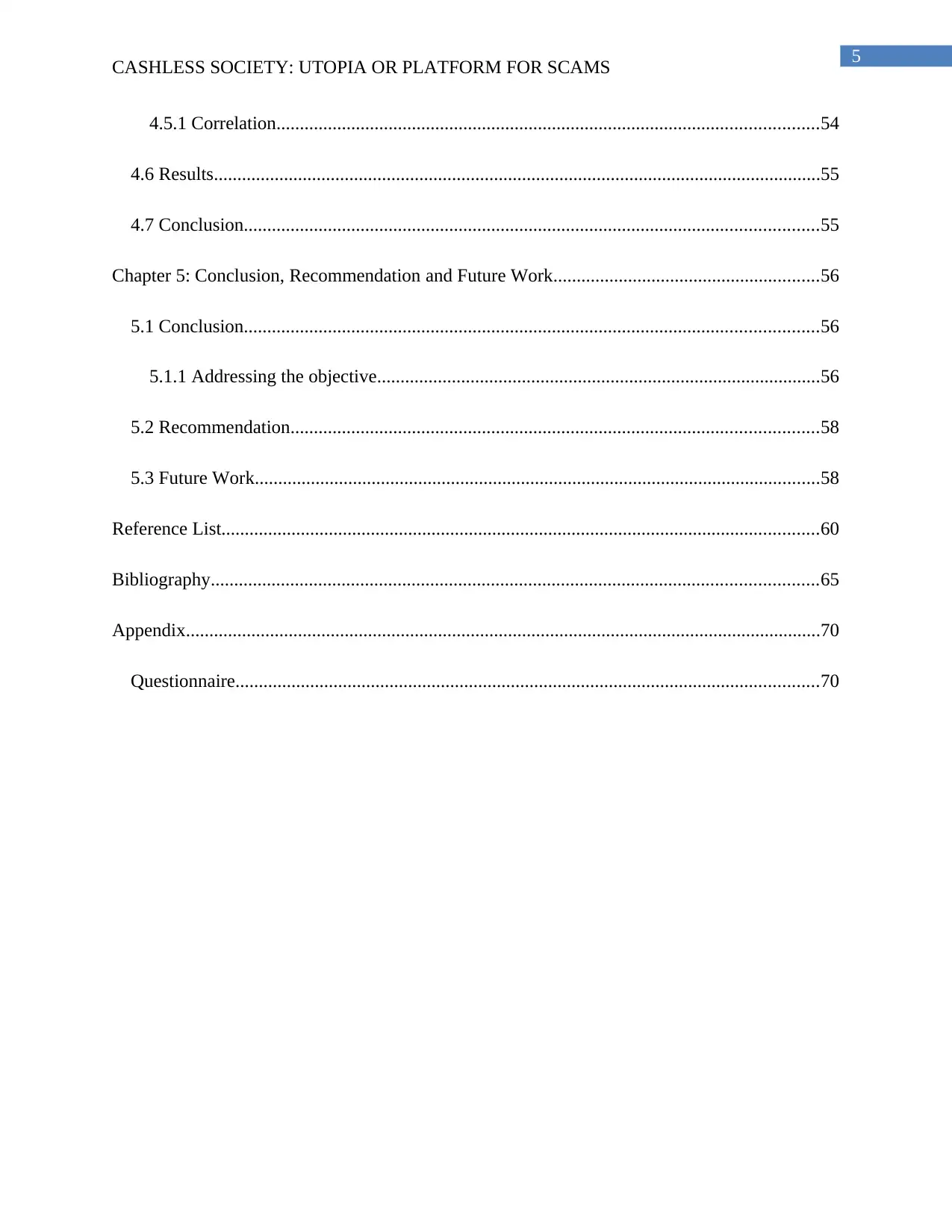
5
CASHLESS SOCIETY: UTOPIA OR PLATFORM FOR SCAMS
4.5.1 Correlation....................................................................................................................54
4.6 Results..................................................................................................................................55
4.7 Conclusion...........................................................................................................................55
Chapter 5: Conclusion, Recommendation and Future Work.........................................................56
5.1 Conclusion...........................................................................................................................56
5.1.1 Addressing the objective...............................................................................................56
5.2 Recommendation.................................................................................................................58
5.3 Future Work.........................................................................................................................58
Reference List................................................................................................................................60
Bibliography..................................................................................................................................65
Appendix........................................................................................................................................70
Questionnaire.............................................................................................................................70
CASHLESS SOCIETY: UTOPIA OR PLATFORM FOR SCAMS
4.5.1 Correlation....................................................................................................................54
4.6 Results..................................................................................................................................55
4.7 Conclusion...........................................................................................................................55
Chapter 5: Conclusion, Recommendation and Future Work.........................................................56
5.1 Conclusion...........................................................................................................................56
5.1.1 Addressing the objective...............................................................................................56
5.2 Recommendation.................................................................................................................58
5.3 Future Work.........................................................................................................................58
Reference List................................................................................................................................60
Bibliography..................................................................................................................................65
Appendix........................................................................................................................................70
Questionnaire.............................................................................................................................70
⊘ This is a preview!⊘
Do you want full access?
Subscribe today to unlock all pages.

Trusted by 1+ million students worldwide
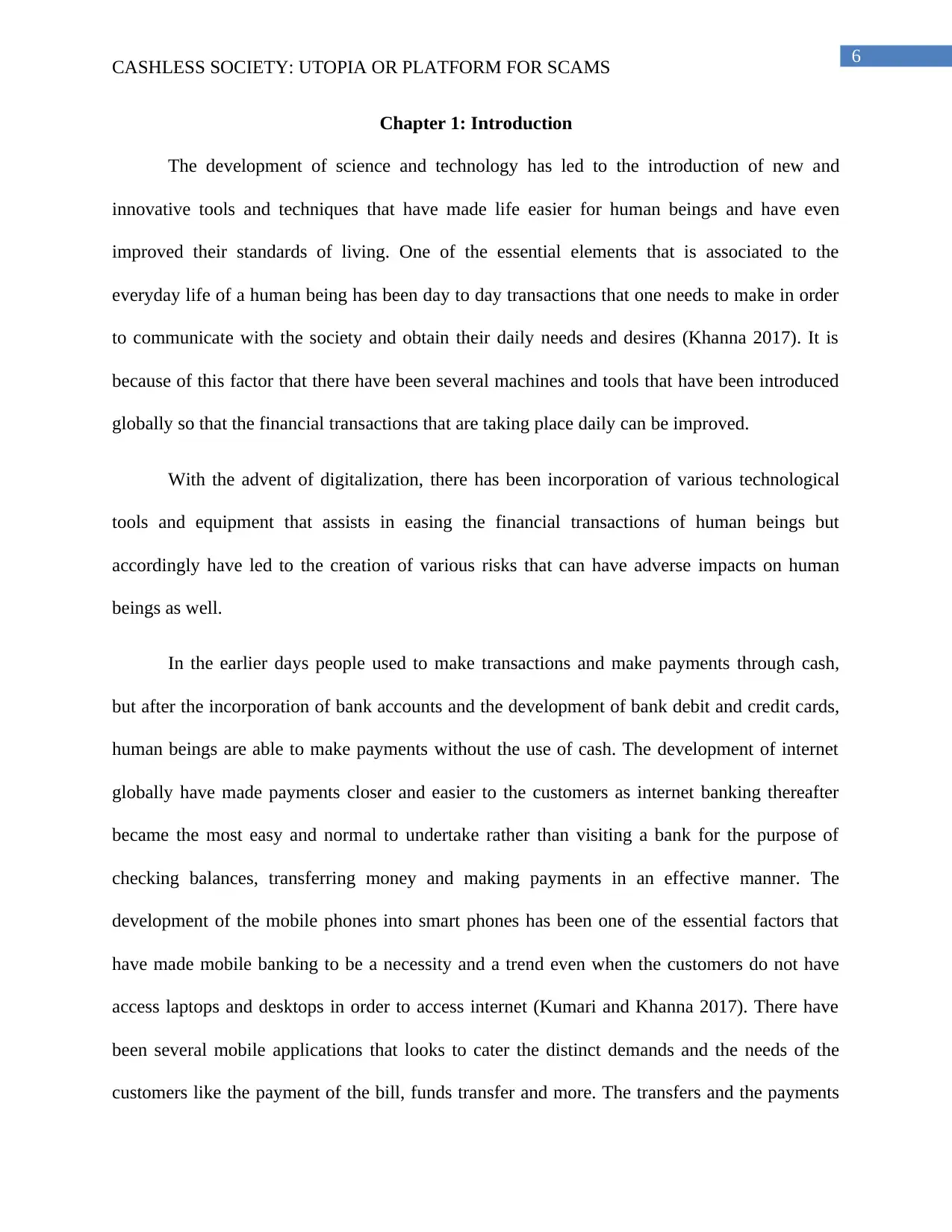
6
CASHLESS SOCIETY: UTOPIA OR PLATFORM FOR SCAMS
Chapter 1: Introduction
The development of science and technology has led to the introduction of new and
innovative tools and techniques that have made life easier for human beings and have even
improved their standards of living. One of the essential elements that is associated to the
everyday life of a human being has been day to day transactions that one needs to make in order
to communicate with the society and obtain their daily needs and desires (Khanna 2017). It is
because of this factor that there have been several machines and tools that have been introduced
globally so that the financial transactions that are taking place daily can be improved.
With the advent of digitalization, there has been incorporation of various technological
tools and equipment that assists in easing the financial transactions of human beings but
accordingly have led to the creation of various risks that can have adverse impacts on human
beings as well.
In the earlier days people used to make transactions and make payments through cash,
but after the incorporation of bank accounts and the development of bank debit and credit cards,
human beings are able to make payments without the use of cash. The development of internet
globally have made payments closer and easier to the customers as internet banking thereafter
became the most easy and normal to undertake rather than visiting a bank for the purpose of
checking balances, transferring money and making payments in an effective manner. The
development of the mobile phones into smart phones has been one of the essential factors that
have made mobile banking to be a necessity and a trend even when the customers do not have
access laptops and desktops in order to access internet (Kumari and Khanna 2017). There have
been several mobile applications that looks to cater the distinct demands and the needs of the
customers like the payment of the bill, funds transfer and more. The transfers and the payments
CASHLESS SOCIETY: UTOPIA OR PLATFORM FOR SCAMS
Chapter 1: Introduction
The development of science and technology has led to the introduction of new and
innovative tools and techniques that have made life easier for human beings and have even
improved their standards of living. One of the essential elements that is associated to the
everyday life of a human being has been day to day transactions that one needs to make in order
to communicate with the society and obtain their daily needs and desires (Khanna 2017). It is
because of this factor that there have been several machines and tools that have been introduced
globally so that the financial transactions that are taking place daily can be improved.
With the advent of digitalization, there has been incorporation of various technological
tools and equipment that assists in easing the financial transactions of human beings but
accordingly have led to the creation of various risks that can have adverse impacts on human
beings as well.
In the earlier days people used to make transactions and make payments through cash,
but after the incorporation of bank accounts and the development of bank debit and credit cards,
human beings are able to make payments without the use of cash. The development of internet
globally have made payments closer and easier to the customers as internet banking thereafter
became the most easy and normal to undertake rather than visiting a bank for the purpose of
checking balances, transferring money and making payments in an effective manner. The
development of the mobile phones into smart phones has been one of the essential factors that
have made mobile banking to be a necessity and a trend even when the customers do not have
access laptops and desktops in order to access internet (Kumari and Khanna 2017). There have
been several mobile applications that looks to cater the distinct demands and the needs of the
customers like the payment of the bill, funds transfer and more. The transfers and the payments
Paraphrase This Document
Need a fresh take? Get an instant paraphrase of this document with our AI Paraphraser
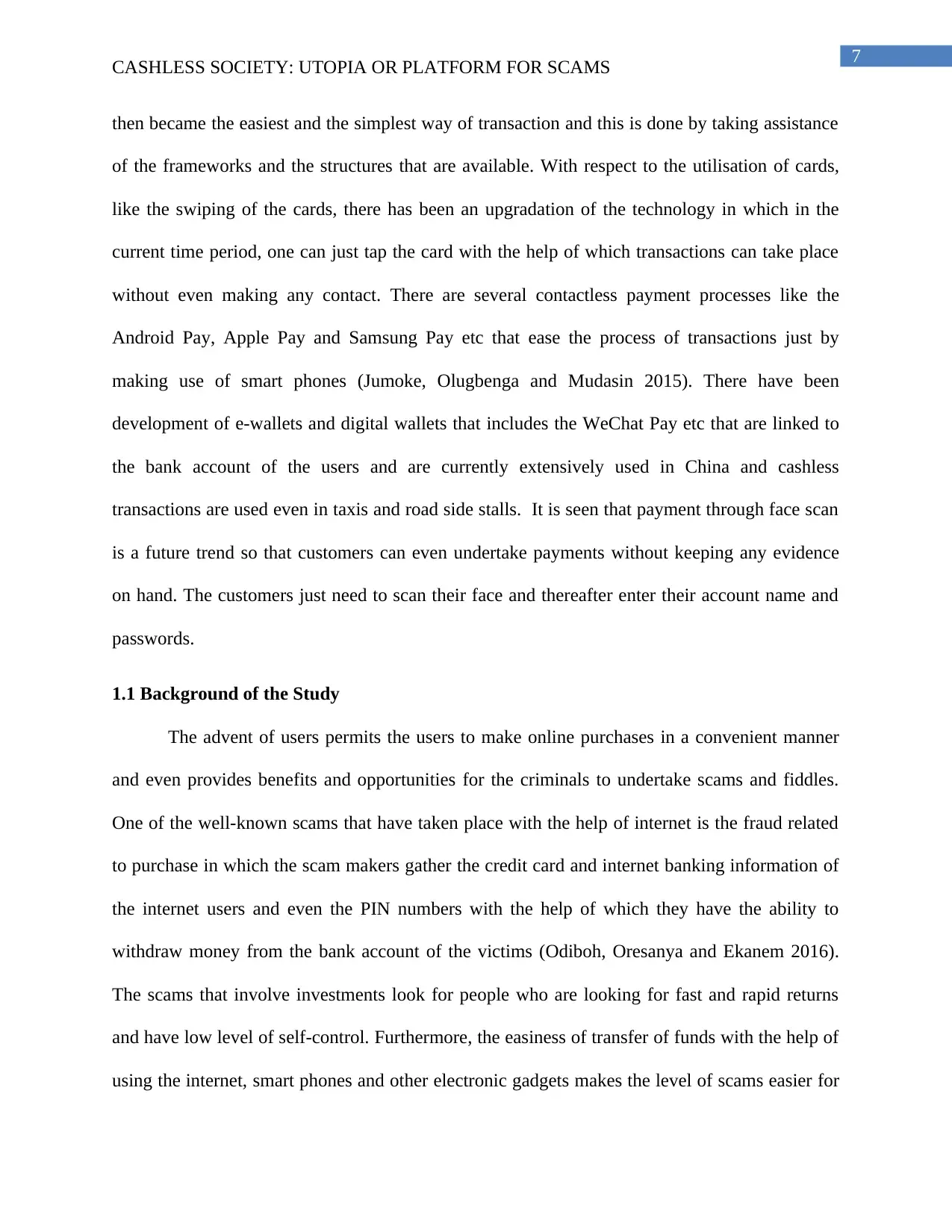
7
CASHLESS SOCIETY: UTOPIA OR PLATFORM FOR SCAMS
then became the easiest and the simplest way of transaction and this is done by taking assistance
of the frameworks and the structures that are available. With respect to the utilisation of cards,
like the swiping of the cards, there has been an upgradation of the technology in which in the
current time period, one can just tap the card with the help of which transactions can take place
without even making any contact. There are several contactless payment processes like the
Android Pay, Apple Pay and Samsung Pay etc that ease the process of transactions just by
making use of smart phones (Jumoke, Olugbenga and Mudasin 2015). There have been
development of e-wallets and digital wallets that includes the WeChat Pay etc that are linked to
the bank account of the users and are currently extensively used in China and cashless
transactions are used even in taxis and road side stalls. It is seen that payment through face scan
is a future trend so that customers can even undertake payments without keeping any evidence
on hand. The customers just need to scan their face and thereafter enter their account name and
passwords.
1.1 Background of the Study
The advent of users permits the users to make online purchases in a convenient manner
and even provides benefits and opportunities for the criminals to undertake scams and fiddles.
One of the well-known scams that have taken place with the help of internet is the fraud related
to purchase in which the scam makers gather the credit card and internet banking information of
the internet users and even the PIN numbers with the help of which they have the ability to
withdraw money from the bank account of the victims (Odiboh, Oresanya and Ekanem 2016).
The scams that involve investments look for people who are looking for fast and rapid returns
and have low level of self-control. Furthermore, the easiness of transfer of funds with the help of
using the internet, smart phones and other electronic gadgets makes the level of scams easier for
CASHLESS SOCIETY: UTOPIA OR PLATFORM FOR SCAMS
then became the easiest and the simplest way of transaction and this is done by taking assistance
of the frameworks and the structures that are available. With respect to the utilisation of cards,
like the swiping of the cards, there has been an upgradation of the technology in which in the
current time period, one can just tap the card with the help of which transactions can take place
without even making any contact. There are several contactless payment processes like the
Android Pay, Apple Pay and Samsung Pay etc that ease the process of transactions just by
making use of smart phones (Jumoke, Olugbenga and Mudasin 2015). There have been
development of e-wallets and digital wallets that includes the WeChat Pay etc that are linked to
the bank account of the users and are currently extensively used in China and cashless
transactions are used even in taxis and road side stalls. It is seen that payment through face scan
is a future trend so that customers can even undertake payments without keeping any evidence
on hand. The customers just need to scan their face and thereafter enter their account name and
passwords.
1.1 Background of the Study
The advent of users permits the users to make online purchases in a convenient manner
and even provides benefits and opportunities for the criminals to undertake scams and fiddles.
One of the well-known scams that have taken place with the help of internet is the fraud related
to purchase in which the scam makers gather the credit card and internet banking information of
the internet users and even the PIN numbers with the help of which they have the ability to
withdraw money from the bank account of the victims (Odiboh, Oresanya and Ekanem 2016).
The scams that involve investments look for people who are looking for fast and rapid returns
and have low level of self-control. Furthermore, the easiness of transfer of funds with the help of
using the internet, smart phones and other electronic gadgets makes the level of scams easier for
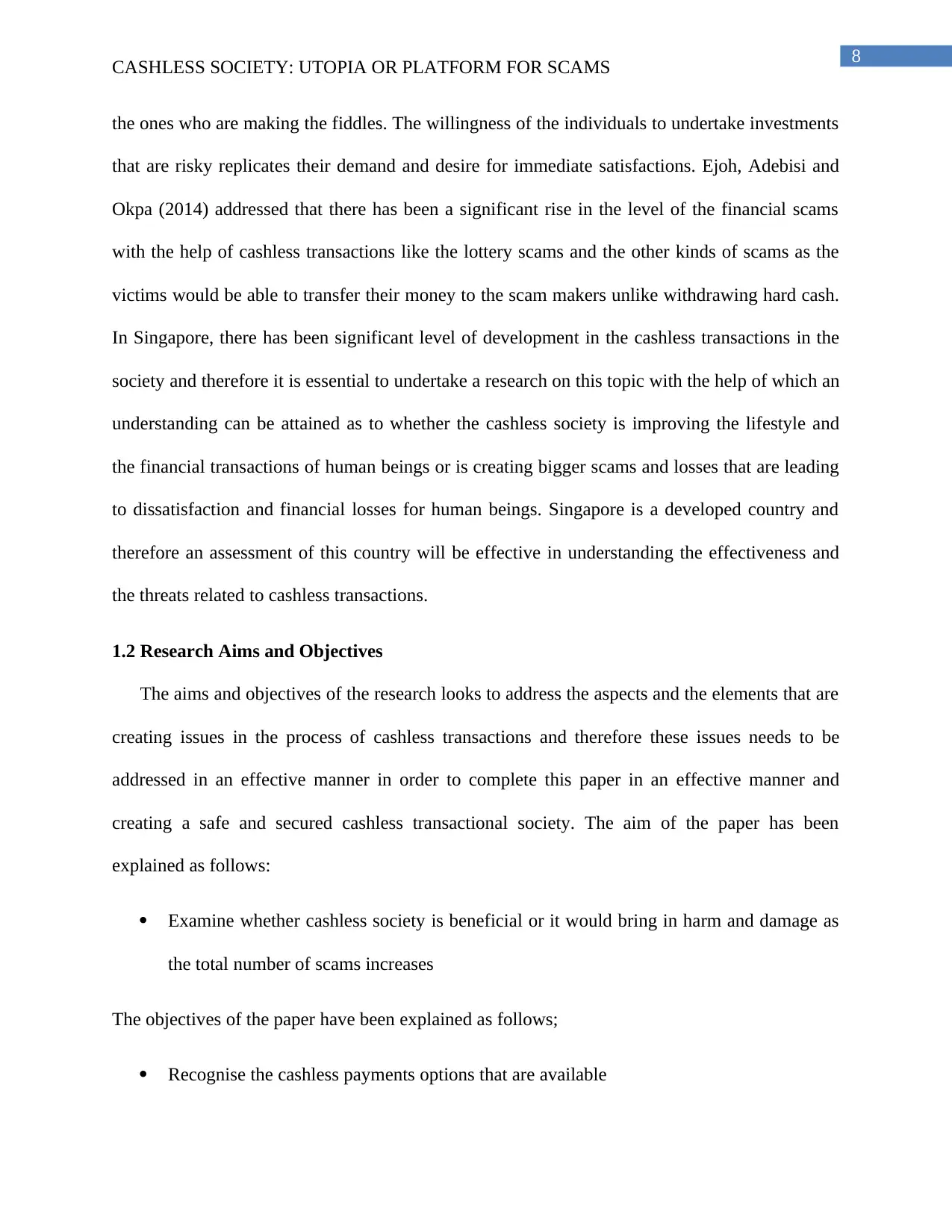
8
CASHLESS SOCIETY: UTOPIA OR PLATFORM FOR SCAMS
the ones who are making the fiddles. The willingness of the individuals to undertake investments
that are risky replicates their demand and desire for immediate satisfactions. Ejoh, Adebisi and
Okpa (2014) addressed that there has been a significant rise in the level of the financial scams
with the help of cashless transactions like the lottery scams and the other kinds of scams as the
victims would be able to transfer their money to the scam makers unlike withdrawing hard cash.
In Singapore, there has been significant level of development in the cashless transactions in the
society and therefore it is essential to undertake a research on this topic with the help of which an
understanding can be attained as to whether the cashless society is improving the lifestyle and
the financial transactions of human beings or is creating bigger scams and losses that are leading
to dissatisfaction and financial losses for human beings. Singapore is a developed country and
therefore an assessment of this country will be effective in understanding the effectiveness and
the threats related to cashless transactions.
1.2 Research Aims and Objectives
The aims and objectives of the research looks to address the aspects and the elements that are
creating issues in the process of cashless transactions and therefore these issues needs to be
addressed in an effective manner in order to complete this paper in an effective manner and
creating a safe and secured cashless transactional society. The aim of the paper has been
explained as follows:
Examine whether cashless society is beneficial or it would bring in harm and damage as
the total number of scams increases
The objectives of the paper have been explained as follows;
Recognise the cashless payments options that are available
CASHLESS SOCIETY: UTOPIA OR PLATFORM FOR SCAMS
the ones who are making the fiddles. The willingness of the individuals to undertake investments
that are risky replicates their demand and desire for immediate satisfactions. Ejoh, Adebisi and
Okpa (2014) addressed that there has been a significant rise in the level of the financial scams
with the help of cashless transactions like the lottery scams and the other kinds of scams as the
victims would be able to transfer their money to the scam makers unlike withdrawing hard cash.
In Singapore, there has been significant level of development in the cashless transactions in the
society and therefore it is essential to undertake a research on this topic with the help of which an
understanding can be attained as to whether the cashless society is improving the lifestyle and
the financial transactions of human beings or is creating bigger scams and losses that are leading
to dissatisfaction and financial losses for human beings. Singapore is a developed country and
therefore an assessment of this country will be effective in understanding the effectiveness and
the threats related to cashless transactions.
1.2 Research Aims and Objectives
The aims and objectives of the research looks to address the aspects and the elements that are
creating issues in the process of cashless transactions and therefore these issues needs to be
addressed in an effective manner in order to complete this paper in an effective manner and
creating a safe and secured cashless transactional society. The aim of the paper has been
explained as follows:
Examine whether cashless society is beneficial or it would bring in harm and damage as
the total number of scams increases
The objectives of the paper have been explained as follows;
Recognise the cashless payments options that are available
⊘ This is a preview!⊘
Do you want full access?
Subscribe today to unlock all pages.

Trusted by 1+ million students worldwide
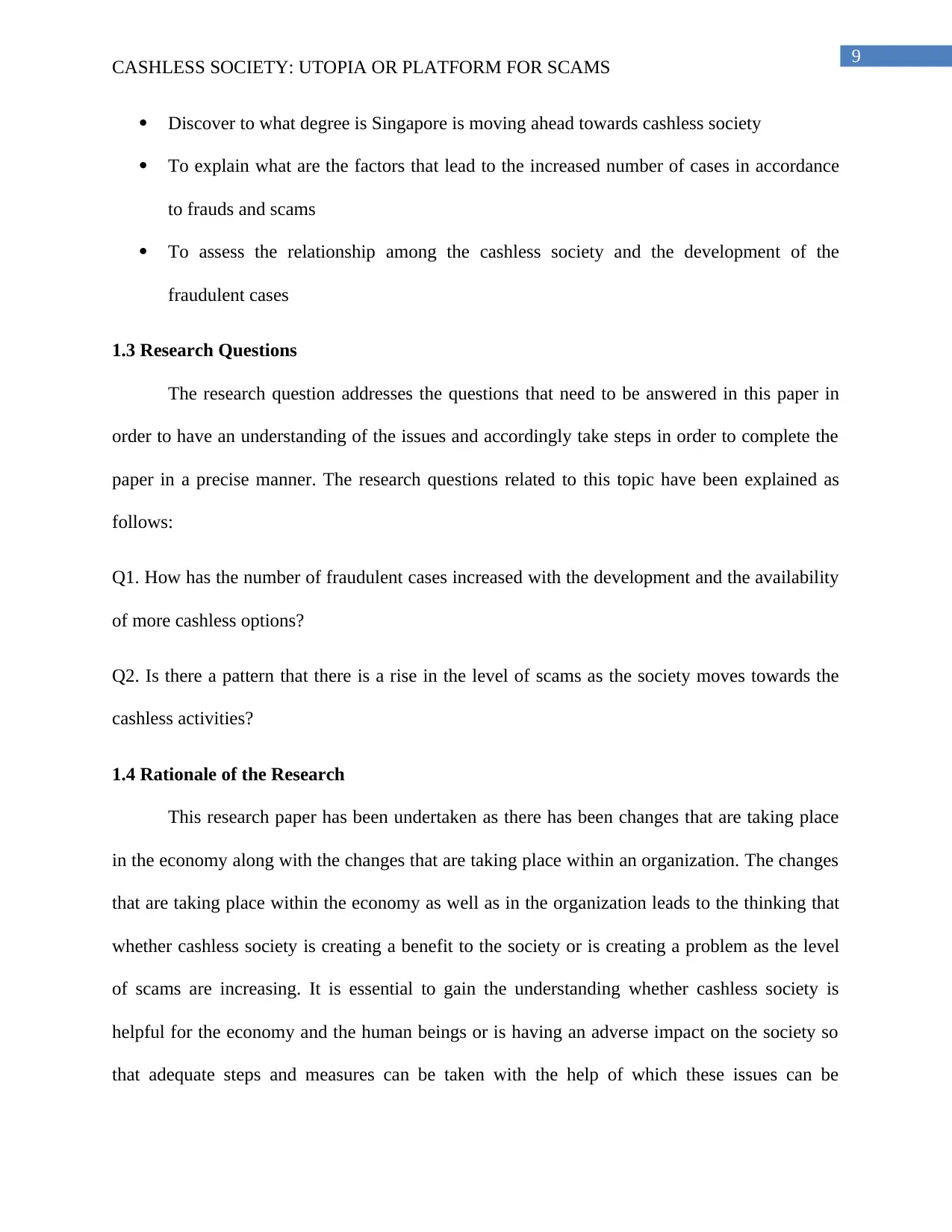
9
CASHLESS SOCIETY: UTOPIA OR PLATFORM FOR SCAMS
Discover to what degree is Singapore is moving ahead towards cashless society
To explain what are the factors that lead to the increased number of cases in accordance
to frauds and scams
To assess the relationship among the cashless society and the development of the
fraudulent cases
1.3 Research Questions
The research question addresses the questions that need to be answered in this paper in
order to have an understanding of the issues and accordingly take steps in order to complete the
paper in a precise manner. The research questions related to this topic have been explained as
follows:
Q1. How has the number of fraudulent cases increased with the development and the availability
of more cashless options?
Q2. Is there a pattern that there is a rise in the level of scams as the society moves towards the
cashless activities?
1.4 Rationale of the Research
This research paper has been undertaken as there has been changes that are taking place
in the economy along with the changes that are taking place within an organization. The changes
that are taking place within the economy as well as in the organization leads to the thinking that
whether cashless society is creating a benefit to the society or is creating a problem as the level
of scams are increasing. It is essential to gain the understanding whether cashless society is
helpful for the economy and the human beings or is having an adverse impact on the society so
that adequate steps and measures can be taken with the help of which these issues can be
CASHLESS SOCIETY: UTOPIA OR PLATFORM FOR SCAMS
Discover to what degree is Singapore is moving ahead towards cashless society
To explain what are the factors that lead to the increased number of cases in accordance
to frauds and scams
To assess the relationship among the cashless society and the development of the
fraudulent cases
1.3 Research Questions
The research question addresses the questions that need to be answered in this paper in
order to have an understanding of the issues and accordingly take steps in order to complete the
paper in a precise manner. The research questions related to this topic have been explained as
follows:
Q1. How has the number of fraudulent cases increased with the development and the availability
of more cashless options?
Q2. Is there a pattern that there is a rise in the level of scams as the society moves towards the
cashless activities?
1.4 Rationale of the Research
This research paper has been undertaken as there has been changes that are taking place
in the economy along with the changes that are taking place within an organization. The changes
that are taking place within the economy as well as in the organization leads to the thinking that
whether cashless society is creating a benefit to the society or is creating a problem as the level
of scams are increasing. It is essential to gain the understanding whether cashless society is
helpful for the economy and the human beings or is having an adverse impact on the society so
that adequate steps and measures can be taken with the help of which these issues can be
Paraphrase This Document
Need a fresh take? Get an instant paraphrase of this document with our AI Paraphraser
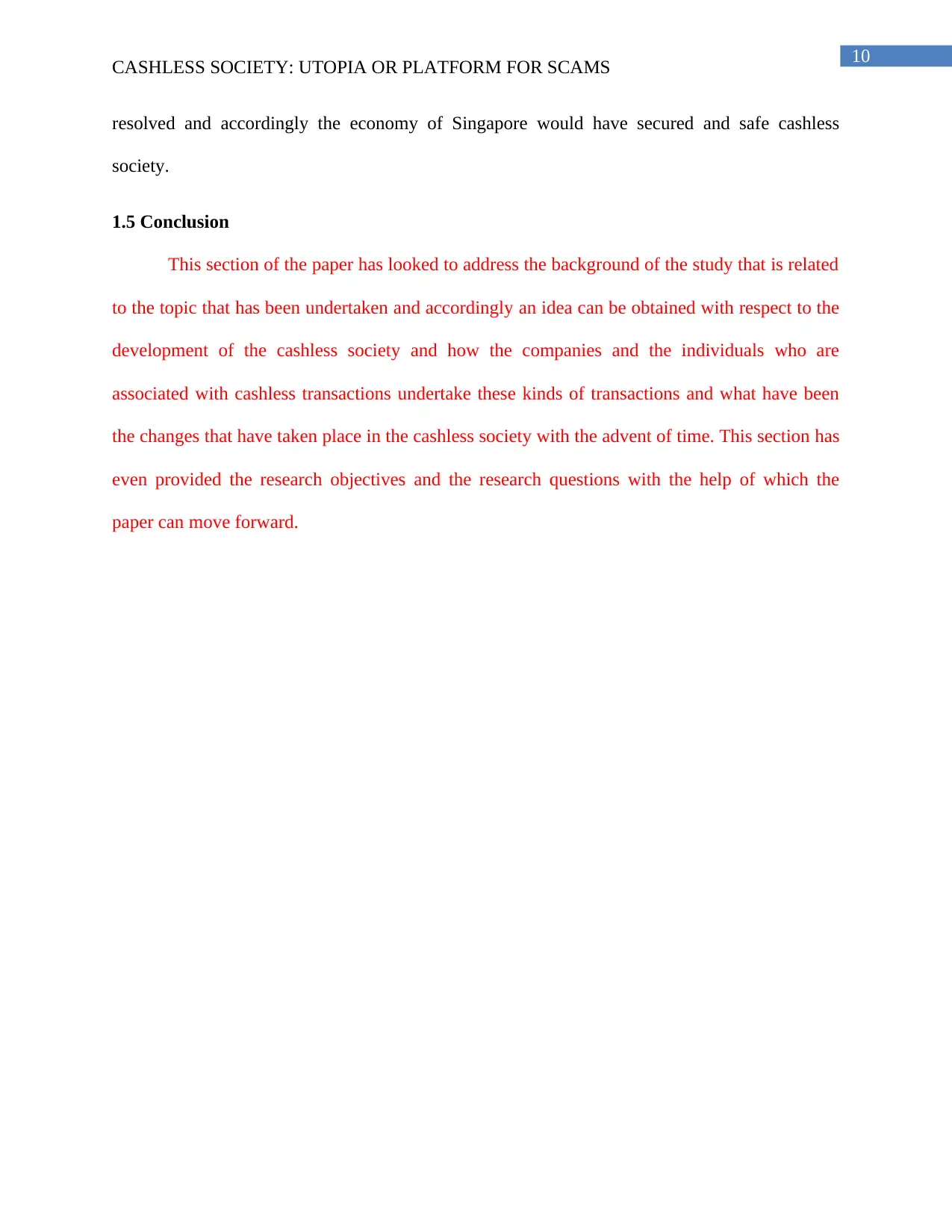
10
CASHLESS SOCIETY: UTOPIA OR PLATFORM FOR SCAMS
resolved and accordingly the economy of Singapore would have secured and safe cashless
society.
1.5 Conclusion
This section of the paper has looked to address the background of the study that is related
to the topic that has been undertaken and accordingly an idea can be obtained with respect to the
development of the cashless society and how the companies and the individuals who are
associated with cashless transactions undertake these kinds of transactions and what have been
the changes that have taken place in the cashless society with the advent of time. This section has
even provided the research objectives and the research questions with the help of which the
paper can move forward.
CASHLESS SOCIETY: UTOPIA OR PLATFORM FOR SCAMS
resolved and accordingly the economy of Singapore would have secured and safe cashless
society.
1.5 Conclusion
This section of the paper has looked to address the background of the study that is related
to the topic that has been undertaken and accordingly an idea can be obtained with respect to the
development of the cashless society and how the companies and the individuals who are
associated with cashless transactions undertake these kinds of transactions and what have been
the changes that have taken place in the cashless society with the advent of time. This section has
even provided the research objectives and the research questions with the help of which the
paper can move forward.
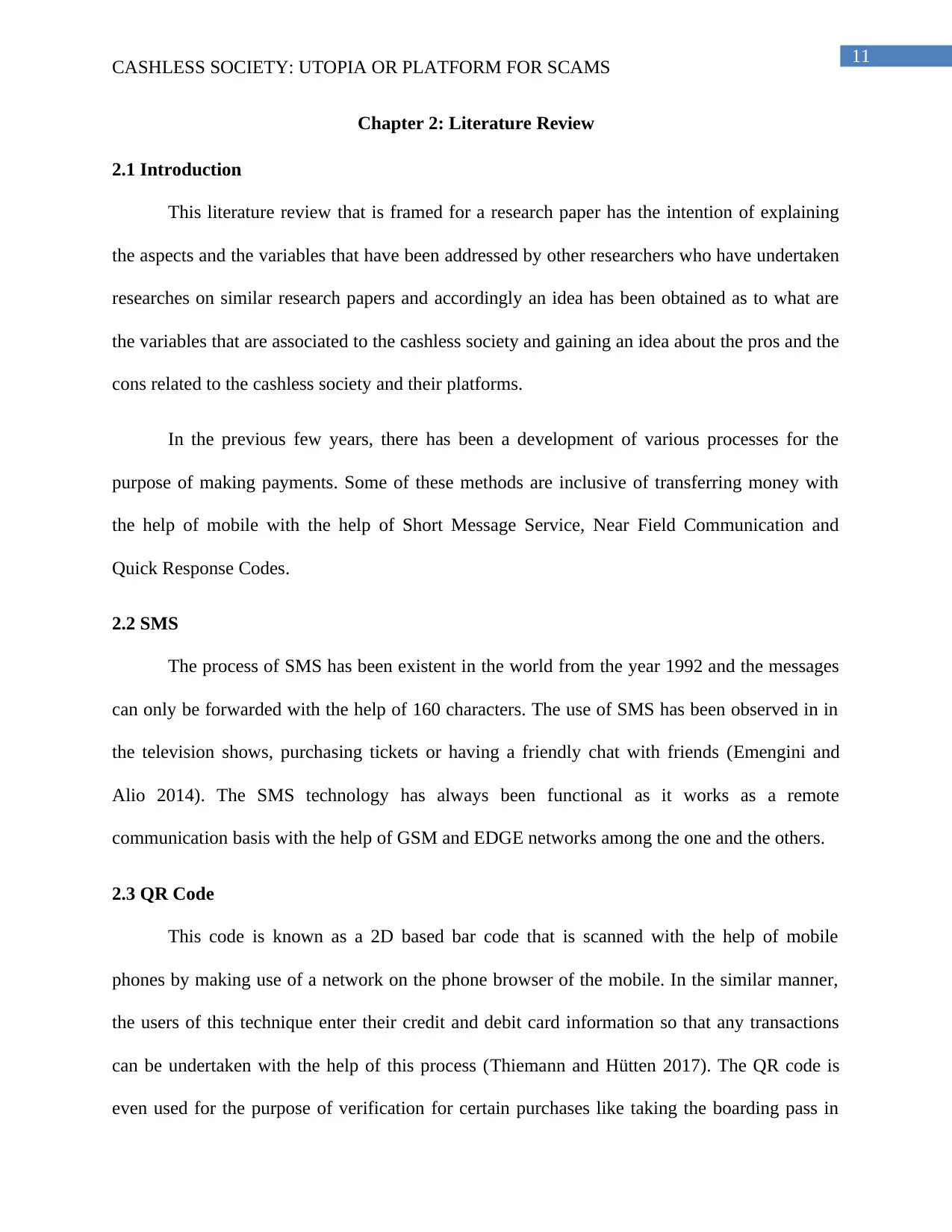
11
CASHLESS SOCIETY: UTOPIA OR PLATFORM FOR SCAMS
Chapter 2: Literature Review
2.1 Introduction
This literature review that is framed for a research paper has the intention of explaining
the aspects and the variables that have been addressed by other researchers who have undertaken
researches on similar research papers and accordingly an idea has been obtained as to what are
the variables that are associated to the cashless society and gaining an idea about the pros and the
cons related to the cashless society and their platforms.
In the previous few years, there has been a development of various processes for the
purpose of making payments. Some of these methods are inclusive of transferring money with
the help of mobile with the help of Short Message Service, Near Field Communication and
Quick Response Codes.
2.2 SMS
The process of SMS has been existent in the world from the year 1992 and the messages
can only be forwarded with the help of 160 characters. The use of SMS has been observed in in
the television shows, purchasing tickets or having a friendly chat with friends (Emengini and
Alio 2014). The SMS technology has always been functional as it works as a remote
communication basis with the help of GSM and EDGE networks among the one and the others.
2.3 QR Code
This code is known as a 2D based bar code that is scanned with the help of mobile
phones by making use of a network on the phone browser of the mobile. In the similar manner,
the users of this technique enter their credit and debit card information so that any transactions
can be undertaken with the help of this process (Thiemann and Hütten 2017). The QR code is
even used for the purpose of verification for certain purchases like taking the boarding pass in
CASHLESS SOCIETY: UTOPIA OR PLATFORM FOR SCAMS
Chapter 2: Literature Review
2.1 Introduction
This literature review that is framed for a research paper has the intention of explaining
the aspects and the variables that have been addressed by other researchers who have undertaken
researches on similar research papers and accordingly an idea has been obtained as to what are
the variables that are associated to the cashless society and gaining an idea about the pros and the
cons related to the cashless society and their platforms.
In the previous few years, there has been a development of various processes for the
purpose of making payments. Some of these methods are inclusive of transferring money with
the help of mobile with the help of Short Message Service, Near Field Communication and
Quick Response Codes.
2.2 SMS
The process of SMS has been existent in the world from the year 1992 and the messages
can only be forwarded with the help of 160 characters. The use of SMS has been observed in in
the television shows, purchasing tickets or having a friendly chat with friends (Emengini and
Alio 2014). The SMS technology has always been functional as it works as a remote
communication basis with the help of GSM and EDGE networks among the one and the others.
2.3 QR Code
This code is known as a 2D based bar code that is scanned with the help of mobile
phones by making use of a network on the phone browser of the mobile. In the similar manner,
the users of this technique enter their credit and debit card information so that any transactions
can be undertaken with the help of this process (Thiemann and Hütten 2017). The QR code is
even used for the purpose of verification for certain purchases like taking the boarding pass in
⊘ This is a preview!⊘
Do you want full access?
Subscribe today to unlock all pages.

Trusted by 1+ million students worldwide
1 out of 72
Related Documents
Your All-in-One AI-Powered Toolkit for Academic Success.
+13062052269
info@desklib.com
Available 24*7 on WhatsApp / Email
![[object Object]](/_next/static/media/star-bottom.7253800d.svg)
Unlock your academic potential
Copyright © 2020–2026 A2Z Services. All Rights Reserved. Developed and managed by ZUCOL.





